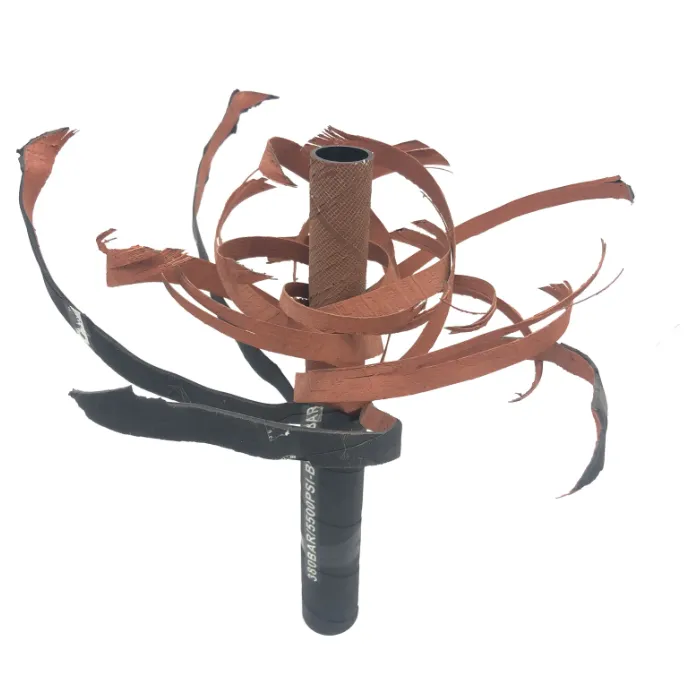335345435
Jun . 23, 2025 15:46 Back to list
Hydraulic Hose Wholesale: A Wholesaler’s Playbook for Strategic Sourcing
In the competitive realm of industrial supplies, mastering the art of hydraulic hose wholesale is essential for wholesalers aiming to deliver value and build enduring client relationships. Whether you’re servicing construction, agriculture, or manufacturing sectors, sourcing high-performance hydraulic solutions demands a blend of technical know-how and market insight. Here’s a comprehensive guide to navigating the landscape—with a focus on quality, compliance, and customer-centric strategies.

Hydraulic Hose for Sale: Decoding Material and Performance Metrics
When evaluating hydraulic hose for sale, start with the core: material composition dictates durability in high-pressure environments. Look for hoses constructed from synthetic rubber (e.g., EPDM or NBR) for resistance to oil, abrasion, and temperature fluctuations. Reinforcement layers are non-negotiable—braided steel, aramid fibers, or polyester threads enhance burst pressure ratings, with multi-layer designs ideal for heavy-duty applications (think 5000+ PSI in construction equipment).
Case in point: A hydraulic hose used in excavator systems must withstand constant flexing without kinking. Suppliers who provide detailed technical data—such as SAE 100R12 compliance for thermoplastic hoses or R5 standards for textile-reinforced types—demonstrate transparency. Always verify working pressure, temperature range (-40°F to 212°F is common for standard hoses), and chemical compatibility to avoid costly returns.
Hydraulic Hose Bulk: Inventory Management for Efficiency
Sourcing hydraulic hose bulk requires a strategic approach to inventory. Balance popular sizes (1/4" to 1" diameters) with industry-specific demands: agriculture clients might need 3/8" hoses for sprayers, while manufacturing facilities prefer 1/2" options for hydraulic presses. Consider these tips:
Length Varieties: Stock hoses in 25ft, 50ft, and 100ft rolls to cater to quick repairs and large projects. A 50ft, 3/8" hose is a versatile staple for most applications.
Specialized Types: Include heat-resistant hoses (rated for 300°F+) for engine compartments and food-grade hoses (FDA-compliant) for pharmaceutical or food processing sectors. These niches can command higher margins.
Bulk Packaging: Opt for suppliers who offer palletized or boxed bulk orders to minimize shipping costs and storage hassles. Look for hydraulic hose bulk deals that include free cutting or custom labeling for added convenience.
Hydraulic Fittings for Sale: Compatibility and Compliance Essentials
No hydraulic system is complete without reliable fittings. When offering hydraulic fittings for sale, prioritize compatibility with hose types and end-use equipment:
Fitting Types: Stock common styles like NPT (National Pipe Thread), JIC (Joint Industry Council), and ORFS (O-Ring Face Seal) to cover diverse applications. Quick-connect fittings are a must for industries requiring frequent hose changes.
Material Grade: Stainless steel fittings excel in corrosive environments (e.g., marine or saltwater use), while carbon steel with zinc plating is ideal for general industrial needs. Always confirm plating thickness (minimum 5μm for rust resistance).
Wholesale Hydraulic Fittings: Scaling with Supplier Expertise
Partnering with manufacturers who offer wholesale hydraulic fittings alongside hoses streamlines your supply chain. Look for suppliers like Dayi Rubber Products Co., Ltd., which integrates in-house mixing workshops (for custom rubber compounds) with advanced testing equipment (computer-controlled hydrostatic testers and pulse tables). Benefits include:
Custom Solutions: Ability to source fittings with unique thread specifications or anti-vibration designs for specialized machinery.
Bundling Discounts: Negotiate bulk pricing when purchasing hoses and fittings together, passing savings to clients to boost competitiveness.
Quality Assurance: Suppliers with in-house testing can provide batch certificates for pressure, leak, and fatigue resistance—critical for winning bids in large-scale projects.
FAQ: Navigating Hydraulic Hose and Fitting Queries
How do I match a hydraulic hose to its working pressure?
The hose’s working pressure must be at least 1.5 times the system’s maximum pressure. For example, a 3000 PSI system requires a hose rated for 4500 PSI or higher to ensure safety margins.
Can I mix different brands of hydraulic hoses and fittings?
It’s risky. Inconsistent manufacturing standards (e.g., thread pitch or O-ring groove dimensions) can cause leaks. Always use fittings from the same manufacturer as the hose, or verify cross-compatibility through technical data.
What’s the shelf life of hydraulic hoses in bulk storage?
Properly stored (cool, dry, away from sunlight), hoses can last 3–5 years. Avoid coiling them too tightly, and rotate inventory to use older stock first. Check for cracking or stiffness before use.
How important are MSHA certifications for hydraulic fittings?
Critical for mining, construction, or any application in regulated industries. MSHA-certified fittings meet strict safety standards for flame resistance and structural integrity, preventing fines and ensuring worker safety.
How do I reduce kinking in hydraulic hoses during installation?
Use hoses with built-in anti-kink springs near fittings, and allow for natural bends (minimum bend radius should be 5–10 times the hose diameter). Avoid routing hoses over sharp edges or under heavy equipment.
Elevate Your Wholesale Game: From Product to Solution
As a wholesaler, your role extends beyond selling products—it’s about solving problems. By prioritizing material science, compliance, and inventory flexibility in your hydraulic hose wholesale strategy, you position your business as a trusted partner for clients. Remember: a well-sourced hydraulic system isn’t just a collection of parts—it’s the backbone of industrial productivity.
Ready to transform your inventory? Collaborate with manufacturers who blend technical innovation (patented reinforcement designs, advanced extrusion machinery) with certification rigor (ISO 9001, MSHA) to deliver solutions that stand up to the toughest jobs. Your clients will value the reliability—and your bottom line will reflect the difference.
-
LPG Hose: Choosing the Right Hose for Safe, Reliable Gas Transfer
NewsAug.07,2025
-
Industrial Hose: Types, Applications, and Where to Find Reliable Suppliers
NewsAug.07,2025
-
Hydraulic Hose Pipe: Types, Pricing, and How to Source the Right One
NewsAug.07,2025
-
Hydraulic Fittings: Types, Customization, and Where to Source Them
NewsAug.07,2025
-
High Pressure Washer Hoses: Buying Guide, Specs, and Supplier Insights
NewsAug.07,2025
-
Choosing the Right Gasoline Hose: Flexibility, Resistance, and Supply Options
NewsAug.07,2025



